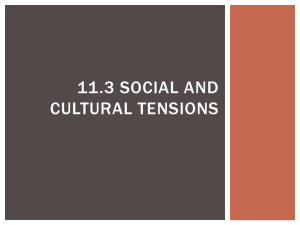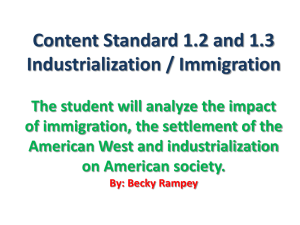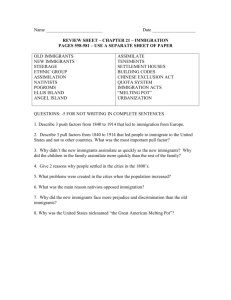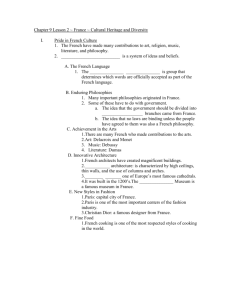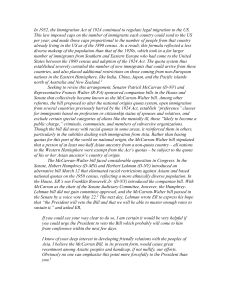Against the National Origins Act of 1924
advertisement
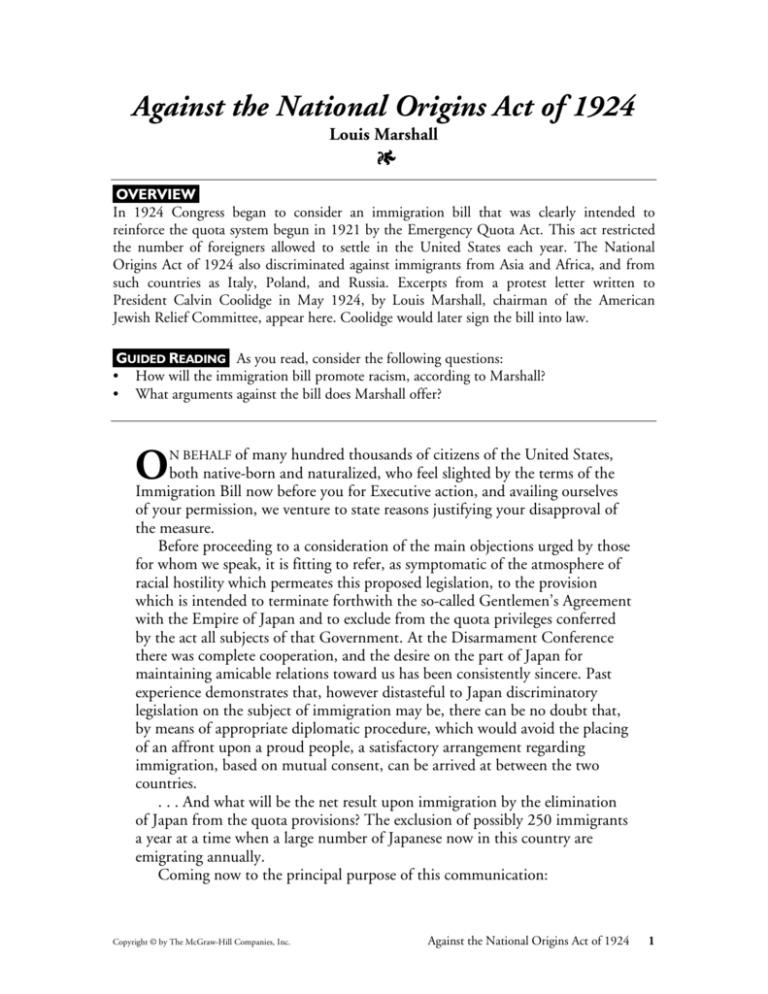
Against the National Origins Act of 1924 Louis Marshall 1 OVERVIEW In 1924 Congress began to consider an immigration bill that was clearly intended to reinforce the quota system begun in 1921 by the Emergency Quota Act. This act restricted the number of foreigners allowed to settle in the United States each year. The National Origins Act of 1924 also discriminated against immigrants from Asia and Africa, and from such countries as Italy, Poland, and Russia. Excerpts from a protest letter written to President Calvin Coolidge in May 1924, by Louis Marshall, chairman of the American Jewish Relief Committee, appear here. Coolidge would later sign the bill into law. GUIDED READING As you read, consider the following questions: • How will the immigration bill promote racism, according to Marshall? • What arguments against the bill does Marshall offer? O N BEHALF of many hundred thousands of citizens of the United States, both native-born and naturalized, who feel slighted by the terms of the Immigration Bill now before you for Executive action, and availing ourselves of your permission, we venture to state reasons justifying your disapproval of the measure. Before proceeding to a consideration of the main objections urged by those for whom we speak, it is fitting to refer, as symptomatic of the atmosphere of racial hostility which permeates this proposed legislation, to the provision which is intended to terminate forthwith the so-called Gentlemen’s Agreement with the Empire of Japan and to exclude from the quota privileges conferred by the act all subjects of that Government. At the Disarmament Conference there was complete cooperation, and the desire on the part of Japan for maintaining amicable relations toward us has been consistently sincere. Past experience demonstrates that, however distasteful to Japan discriminatory legislation on the subject of immigration may be, there can be no doubt that, by means of appropriate diplomatic procedure, which would avoid the placing of an affront upon a proud people, a satisfactory arrangement regarding immigration, based on mutual consent, can be arrived at between the two countries. . . . And what will be the net result upon immigration by the elimination of Japan from the quota provisions? The exclusion of possibly 250 immigrants a year at a time when a large number of Japanese now in this country are emigrating annually. Coming now to the principal purpose of this communication: Copyright © by The McGraw-Hill Companies, Inc. Against the National Origins Act of 1924 1 (1) The central provision of this bill . . . limits the annual quota of any nationality to two per centum of the number of foreign-born individuals of such nationality residing in continental United States as determined by the census of 1890, the minimum quota to any nationality being 100. The present quota law is based on the census of 1910 and fixes a rate of three per cent. . . . The census of 1910 was chosen because that of 1920 was not then available. The idea was that the proper test was the number of foreign-born individuals of the various nationalities in the country at the time the quota was to become effective. Even that bill gave rise to great hardships. It was, however, fair, in that it did not discriminate among the foreign-born individuals of various nationalities. The present bill, however, is avowedly discriminatory, as is apparent from the Majority and Minority Reports of the House Committee on Immigration which reported this bill. While under the present law the number of immigrants who come from Northern and Western Europe and of those who come from Southern and Eastern Europe are equal, under this bill the number of immigrants who may come from Northern and Western Europe is largely increased, even on the reduced basis of two per cent., over the number admitted from those countries under the present law, whereas those coming from Southern and Eastern Europe will not exceed one-fifth of those now admitted from that portion of Europe. . . . This is the first time in the history of American legislation that there has been an attempt to discriminate in respect to European immigration between those who come from different parts of the continent. It is not only a differentiation as to countries of origin, but also of racial stocks and of religious beliefs. Those coming from Northern and Western Europe are supposed to be Anglo-Saxon or mythical Nordics, and to a large extent Protestant. Those coming from Southern and Eastern Europe are of different racial stocks and of a different faith. There are today in this country millions of citizens, both native-born and naturalized, descended from those racial stocks and entertaining those religious beliefs against which this bill deliberately discriminates. There is no mincing of the matter. To add insult to injury, the effort has been made to justify this class legislation by charging that those who are sought to be excluded are inferior types and not assimilable. There is no justification in fact for such a contention. In common with all other immigrants, those who have come from the countries sought to be tabooed have been industrious and law-abiding and have made valuable contributions to our industrial, commercial and social development. . . . To say that they are not assimilable argues ignorance. The facts show that they adopt American standards of living and that they are permeated with the spirit of our institutions. It is said that they speak foreign languages, but in those foreign languages they are taught to love our Government, and to a very great extent they are acquiring the use of the English language as completely as Copyright © by The McGraw-Hill Companies, Inc. Against the National Origins Act of 1924 2 most Americans would acquire foreign languages were they to migrate to other countries. . . . What we regard as the danger lurking in this legislation is, that it stimulates racial, national and religious hatreds and jealousies, that it encourages one part of our population to arrogate to itself a sense of superiority, and to classify another as one of inferiority. At a time when the welfare of the human race as an entirety depends upon the creation of a brotherly spirit, the restoration of peace, harmony and unity, and the termination of past animosities engendered by the insanity and brutality of war, it should be our purpose, as a nation which has demonstrated that those of diverse racial, national and religious origins can live together and prosper as a united people, to serve as the world’s conciliator. Instead of that this bill, if it becomes a law, is destined to become the very Apple of Discord. (2) Subdivision (b) of Section 11 only adds to the injustice and the confusion of thought which characterize this bill. . . . This section provides that the annual quota of any nationality for the fiscal year beginning July 1, 1927, and for each fiscal year thereafter, shall be a number which bears the same ratio to 150,000 as the number of immigrants in continental United States in 1920 having that national origin bears to the number of inhabitants in continental United States in 1920. This attempts to fix indefinitely, beginning three years hence, the number of immigrants to be admitted at 150,000. Heretofore we have had no difficulty in absorbing a million immigrants a year. From August, 1914, down to 1920, because of the war, there were practically no immigrants into the United States—in fact during that period the emigrants exceeded in number the immigrants; and yet there is an attempt to determine once for all the number of immigrants who are to be admitted into our vast domain to supply our industries and to meet our many other needs. But here, again, the vice of the legislation is that it is based entirely on national origin, regardless of fitness or usefulness, diligence or energy, or of our country's needs. Moreover, the reference to "national origin" is not to the number of foreign-born individuals of the several nationalities resident in the United States, but it is expected to make a biological, anthropological, ethnological investigation into the birth or ancestry of those resident in the United States in 1920. It is believed that there are no statistics which would make it possible to work out a reliable conclusion as to national origin. The very fact that there have been intermarriages between those of diverse nationalities and that there may be an admixture of the blood of half a dozen nationalities into a single individual, demonstrates the absurdity of such a scheme. Copyright © by The McGraw-Hill Companies, Inc. Against the National Origins Act of 1924 3


